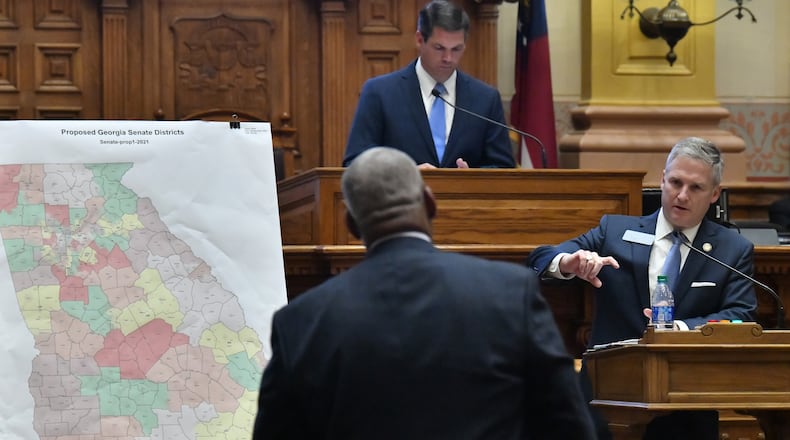The U.S. Supreme Court’s surprise decision that could pave the way for a second majority-Black U.S. House district in Alabama may also bolster a legal challenge seeking to redraw the political boundaries in Georgia.
The court was expected by some experts to weaken the Voting Rights Act, but instead its 5-4 ruling Thursday found Alabama’s GOP-controlled Legislature likely violated the law when it drew a map with one majority-Black seat out of seven congressional districts.
The ruling will be considered in ongoing lawsuits over Georgia’s redistricting, which resulted in Republicans gaining a U.S. House seat in last year’s elections.
Noting similarities between the cases in both states, Georgia State University law professor Anthony Michael Kreis said it is now more likely for courts to rule that Georgia legislators also ran afoul of the law.
“It seems by all accounts that this decision from the Supreme Court today has greenlit that litigation to go forward,” Kreis said. “And it’s very likely that we’re going to have to redraw our districts here in Georgia to comply with the Voting Rights Act.”
The GOP now controls nine of Georgia’s 14 seats in the U.S. House after Republicans in the General Assembly reshaped the 6th Congressional District north of Atlanta so that it includes more heavily white areas. That made the 6th likely to flip from the Democrats to the Republicans.
A judge could decide later this year whether Georgia’s congressional maps, including the new 6th District currently held by Republican U.S. Rep. Rich McCormick, illegally diluted Black voting strength. Previously, the district was represented by Democratic U.S. Rep. Lucy McBath, who now holds office in the neighboring 7th District, after she unseated a fellow Democrat, U.S. Rep. Carolyn Bourdeaux, in a primary.
The Alabama ruling stems from a court case in which voting rights advocates challenged the state’s map, redrawn in 2021 with new data from the latest U.S. census, on grounds that it threatened federal protections for minority voters. Black voters make up roughly 27% of the state’s electorate, yet they held a majority in only one congressional district.
A federal court ruled last year that the Legislature should have drawn another district that gave Black voters more clout. Chief Justice John Roberts and Justice Brett Kavanaugh sided Thursday with the Supreme Court’s three liberal members to uphold the decision.
Democratic leaders applauded the ruling, saying the Supreme Court had correctly stepped in to reaffirm Voting Rights Act protection. Georgia U.S. Sen. Raphael Warnock issued a joint statement with Illinois U.S. Sen. Dick Durbin, who chairs the Judiciary Committee, that called the court’s decision “long overdue.”
U.S. Rep. Suzan DelBene, who chairs the Democratic Party’s campaign arm for House races, called it a “victory for democracy.”
“This decision will affect redistricting cases across the country and help deliver a House of Representatives that better reflects the diversity of our nation, ensuring all voices are represented equally,” she said in a statement.
Still, it’s not certain the ruling will have impact in Georgia where the legal challenge is still pending.
In March 2022, U.S. District Judge Steve Jones found that Georgia’s map could have violated several aspects of the Voting Rights Act but a trial was needed to decide. He allowed the new maps to remain in place for that year’s May primaries, ruling that it was too close to the election to make court-ordered changes.
“The court cautions that this is an interim, non-final ruling that should not be viewed as an indication of how the court will ultimately rule on the merits at trial,” Jones wrote.
“Under the specific circumstances of this case, the court finds that proceeding with the enacted maps for the 2022 election cycle is the right decision,” he added. “But it is a difficult decision.”
Credit: TNS
Credit: TNS
Lawsuits contesting Georgia’s map were filed as soon as Gov. Brian Kemp signed redistricting bills into law Dec. 30, 2021 — 38 days after the General Assembly passed them.
Plaintiffs in the Georgia case, including civil rights and religious groups, alleged that redistricting reduced the voting strength of Black residents even as their population grew by nearly 500,000 over the past decade.
Under the new maps, four of Georgia’s 14 congressional districts have a majority of nonwhite voters, the same as before redistricting. Republicans in 2022 won an additional seat in Congress after drawing the 6th District in a way that all but guaranteed their party’s nominee would prevail, increasing their majority to 9-5 in the state’s U.S. House delegation.
State legislators redrew the district boundaries of that north metro Atlanta congressional district once held by McBath, making the seat more rural so that it includes a much higher number of white voters. That seat was eventually won by McCormick, a conservative emergency room physician.
McBath, meanwhile, switched to a neighboring Gwinnett County-based district that was drawn to be heavily liberal. She ousted Bourdeaux in a 2022 primary.
Advocates are now preparing for a new phase in litigation. The Rev. James Woodall, a former Georgia NAACP chair and voting rights activist, said the ruling could also reshape a separate court case involving the Georgia Public Service Commission.
“The Supreme Court has affirmed in Alabama what we know all too well in Georgia,” Woodall said. “Racial discrimination of Black voters is real.”
The Latest
Featured








